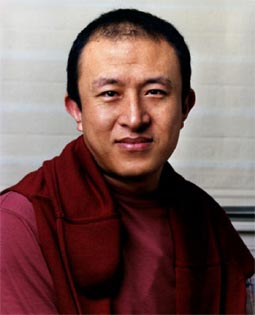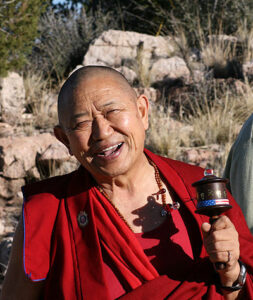Genuine devotion and understanding the teachings
![]()

Dzongsar Jamyang Khyentse Rinpoche
For the sake of all the sentient beings, one must see the truth, and eliminate this clinging to the self of the person and the self of the phenomena.
Most of the time, our inspiration and devotion are very emotionally oriented.
To do that, one has to have tsültrim, discipline, and then one must hear and contemplate teachings like Madhyamakavatara. This is even more important in our modern society because, most of the time, our inspiration and devotion are very emotionally oriented. Normally we think devotion is a bit like faith; like believing in something without much reasoning.Devotion is trusting cause, condition and effect.
But Saraha, in one of his Doha, described devotion as lé gyündré la yi chepa (las rgyu ‘bras la yid chad pa), which means trusting cause, condition and effect. If you have the causes and conditions, and if you don’t have any obstacles, then the result has to follow.
For example, if you have an egg, and enough water and heat, and nobody disturbs it, then the egg will be cooked. That’s a fact. You cannot dismantle that sort of logic or law, and according to Saraha, trusting that rule or law of phenomena is what we call devotion.
If you have merit and genuine devotion, of course, we don’t have to talk about this. But for most of us beginners, although we might have some fleeting temporary devotion, it’s good for us to have a good ground of understanding the teachings through hearing and contemplation, because it will always be like insurance.Emotionally oriented devotion can easily fall apart, so it is good to study the teachings as an insurance
Emotionally oriented devotion can easily fall apart: we are such weak beings that conditions can easily defeat us. Today we may think that our master or the Buddha is wonderful. Tomorrow, a ridiculous or trivial circumstance could arise, such as your guru not liking onion on his pizza, and just because you like onion so much, you might think, what kind of guru is this? That’s so pathetic, but that’s what I mean by emotionally oriented devotion.Similarly, we need to understand the teachings until we can transform the master into the path
We discussed that we should not rely on the teacher, but on his teachings. We should not rely on conception, but on wisdom. We should not rely on expedient teachings, but on absolute teachings.Until we manage to transform the master into the path, we should always have the insurance of having a good ground of understanding the teachings. For most of us, the guru is usually just some kind of big boss, and not a path; taking the lama as the path, lama lam du chepa (bla ma lam du byed pa), is very difficult. So, until we manage to do that, it is good for us to have a little insurance.
As we discussed, conceptions have no end. Things like reincarnation or no reincarnation, whether the mind is brain or not, whether things have beginning or not – all these are conceptions. It’s endless. What we need to really finalise, or actualise, is chö tamché gyi zhiluk (chos thams cad gyi gshis lugs), the reality or the absolute truth of all phenomena.Conceptions are endless; we need to realise the absolute truth of phenomena
Dzongsar Jamyang Khyentse Rinpoche



